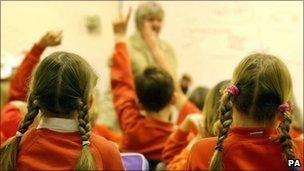Cuts mean schools 'could struggle to maintain services'
- Published

MPs heard there was confusion about the future of some government grants
Many of England's schools will struggle to maintain the services they now offer in the wake of spending cuts, council leaders have warned.
The Commons Education Committee heard schools were actually getting a "flat cash settlement", despite promises of a rise in classroom spending.
And they would have to buy services from councils that they now get free.
There were also concerns about how pressure on places would be managed when building budgets faced a 60% cut.
Giving evidence to the Commons education committee on the impact of the spending review, head of Lambeth children's services Debbie Jones said schools faced a "flat cash position".
This included the government's flagship pupil premium - which aims to target extra funds at schools taking pupils from deprived backgrounds, she said.
So far no details have been given of how much would be provided for this in the first three years of the comprehensive spending review period. But it is expected to be less than the ВЈ2.5bn promised by 2014.
Ms Jones said in her borough, and many other local authority areas, there were huge pressures on pupil places and it was not clear how these would be provided.
She said: "Our borough has seen something like a 24% increase in primary places over the last four years. We have no guarantee that the money will be there to fund the services."
There were also concerns that the 60% cuts to schools' capital budgets would mean schools having to find cash for repairs from budgets that should be spent on teaching.
Lambeth had some classrooms that were badly in need of repair and it was not clear there would be enough money for this, she said.
'Cuts too fast'
She added that the savings councils were having to make meant they would no longer be able to offer the services that they currently offered to schools for free.
"Schools will be faced with being asked to pay for services that are completely free now," she said.
This included fundamental help for pupils with special educational needs and for those with behaviour problems, she said.
Vice-president of the Association of Directors of Children's Services Matt Dunkley also warned that councils were being expected to make large-scale cuts too fast and at a time of major structural change.
And he warned that there needed to be a period of transition in which the charitable and voluntary sector could responded to the new climate.
Family support
He said there was still confusion about which central government grants would remain and how some were being re-worked.
A whole range of centrally determined projects are being withdrawn, with the funds for them being redistributed into a central schools budget.
But there is much confusion about which are covered in the shake-up and which will remain.
Half of children's services revenue came from specific grants from the Department for Education, he said, but councils still had no idea what the rate of reduction would be for a large number of these.
He added: "There are grants we have determined missing in action as we have no idea whether they will turn up."
And there was a lack of clarity about what the new Early Intervention Grant would have to fund on top of the Sure Start children's centres.
The government wants to refocus these centres towards their original intention to help the most deprived children.
'Baby yoga'
Ministers have said they want the centres to start charging for anything that does not form part of the centre's main functions of early years education and parenting help.
But Mr Dunkley said: "Charging for baby yoga classes is not going to create enough revenue to close the gap that we are all talking about."
And he warned that, as councils sought to make savings, they would have to make tough decisions about the kinds of families they could support.
He said that underneath the top tranche of families who were deemed to need support, there was a whole raft of families who were set to lose their support.
In response to the points raised at the hearing, a spokesman for the Department for Education said the "small but real terms increase" in funding for the schools sector was "against the back drop of very tight funding settlements across government with many sectors seeing big cuts to help bring down the deficit".
"We have made major cuts at the centre to maximise spending at the frontline and schools will also have an extra ВЈ1bn from the public sector pay freeze to use in their budgets," the spokesman said.
The government is removing ringfences to give heads more control over their budgets, but schools will still have to make savings, and will be helped to make efficiencies on procurement and back office functions, he added.
- Published20 October 2010
- Published22 October 2010
- Published24 October 2010